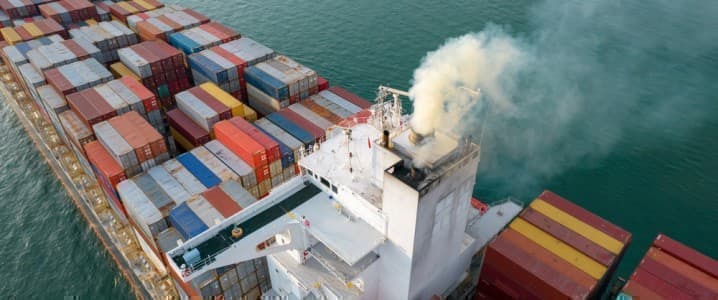The International Maritime Organisation (IMO) hopes to introduce a levy on shipping companies that do not reduce their greenhouse gas (GHG) emissions in line with expectations. Several maritime nations are in support of this effort, including Denmark and the Marshall Islands. Funds from the levy could support countries trying to tackle climate change and could encourage companies in the maritime sector to cut emissions. The shipping industry transports approximately 90 percent of global trade and contributes around 3 percent of global CO2 emissions. Because shipping is an international industry, crossing various water borders to carry out business, its GHG emissions have been difficult.
Member states of the UN IMO held a meeting in early July to discuss the potential for an agreement on the levy. Proposals were submitted from several EU countries, the Marshall Islands, Solomon Islands and others on how the levy might be shaped. The representatives were expected to discuss aspects such as the price of carbon dioxide and how money from the levy should be spent. Several European countries, including France, have been garnering support for the levy with their trade partners.
Pacific Island nations have proposed a $100 per-tonne-of-CO2 charge to shipping companies starting in 2025. They suggested that the revenues should be used for countries facing extreme weather events due to climate change, as well as low-carbon shipping technologies. The Marshall Islands' envoy Albon Ishoda explained, “The Pacific is pushing for a majority of the revenue to support the most climate vulnerable in responding to climate change.”
Meanwhile, a representative in Ireland believes that the funds should be used to combat climate change in underfunded, developing countries, in support of a global green transiton. The World Bank estimated that revenues from a carbon dioxide levy in the shipping industry could bring in between $40 and $60 billion a year from 2025 to 2050. However, the U.S. was not so sure about the introduction of a levy, with American representatives unwilling to provide a definitive response to the proposal.
At the IMO meeting earlier this month, discussions about the introduction of a maritime levy were delayed, although an agreement was achieved over a GHG reduction goal for international shipping. Two weeks of talked culminated in an agreement with the aim of cutting the carbon intensity of international shipping by 40 percent by the end of the decade compared with 2008 levels. This figure relates to the emissions produced per cargo and distance travelled. Member states also agreed to curb the total international shipping emissions by a minimum of 20 percent by 2030. The IMO also announced it hopes international shipping to achieve net-zero emissions “close to” 2050.
However, climate activists are unhappy with the outcome of the conference, having called on representatives to agree to the target of a 50 percent emissions reduction by 2030. Environmentalists say that the targets introduced at the conference are below what is needed to meet Paris Agreement climate pledges and limit global heating to 1.5oC above pre-industrial levels. The states agreed that at least 5 percent of energy used in international shopping should be zero carbon or near zero carbon by 2030, with the hope of getting closer to 10 percent. The marine programme lead at the International Council on Clean Transportation (ICCT), Bryan Comer, stated: “By our estimates, international shipping will exceed its 1.5C carbon budget by approximately 2032 under this agreement.” Other climate organisations believe this was a wasted opportunity at bringing meaningful change to the shipping industry.
During the conference, China, Argentina, Peru, Chile, Uruguay, Guatemala, Paraguay, Thailand, Cuba, Venezuela, Bangladesh, Belarus, Russia, Ecuador, Nicaragua, Colombia, and Saudi Arabia all, apparently, stated their opposition to the introduction of a levy. Meanwhile, several EU member states, South Korea and Japan were all vocal about their support for a levy, further supported by the World Bank.
It is now unlikely that any levy on international shipping will be introduced before 2027. In addition, the IMO has been repeatedly criticised for its lack of action on climate change, with maritime emissions having been excluded from the Paris Agreement, making it the principal institution to control GHG emissions in the sector. Many member states highlighted the unwillingness of the IMO to address the issue of climate change in the sector, accusing the organisation of being slow and opaque in its actions.
There have been repeated calls to decarbonise shipping, with most efforts happening at the national level in ports and in manufacturing operations. Yet, greater carbon cutting efforts in the shipping industry will require cohesive action from several state governments and international organisations as trade happens across various country jurisdictions. And unless the IMO acts to initiate stricter regulations or introduce a level, little change is expected to happen within the next decade.
By Felicity Bradstock for Oilprice.com
More Top Reads From Oilprice.com:
- Germany’s Onshore Wind Power Additions Not Enough To Meet 2030 Targets
- Corruption Continues To Plague Mexico’s State-Owned Oil Company
- What Happens If Consumers Lose Confidence In The Electricity Industry?


















